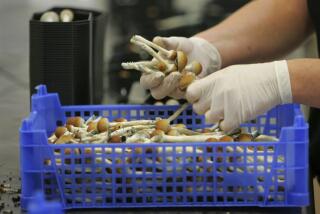Illinois Senate approves bill to legalize medical marijuana

Illinois has come within a signature of becoming the 19th state to allow marijuana use for medical purposes.
On Friday, the state Senate voted 35-21 to approve a medical marijuana measure, which now will head for Gov. Pat Quinnâs desk. The governor has not said whether he will sign it.
Democratic Sen. Bill Haine, one of the billâs sponsors, told the Los Angeles Times that House Bill 1 has a very narrow scope and was crafted with law enforcement officials at the table to avoid the mistakes and pitfalls of medical marijuana programs in other states.
Eighteen states and Washington, D.C., have decriminalized marijuana use for medicinal purposes. California did so in 1996, when the stateâs voters approved Proposition 215.
If it becomes law, the Illinois bill will prohibit patients from growing their own pot; instead, plants will be raised at âgrow centersâ overseen by authorities and the state Department of Agriculture.
Only doctors that have established relationships with patients will be able to dispense the drug to help with pain or side effects associated with treating serious illnesses, such as AIDS or cancer.
âIt canât be consumed in public. It canât be displayed in public,â Haine said.
The bill would allow medical marijuana use for just four years, essentially creating a pilot program on the drugâs use. If itâs not renewed by the stateâs General Assembly, the medical pot effort will die.
A former chief prosecutor for Madison County in southwestern Illinois, Haine said he pushed for the legislation because he believes marijuana, despite its reputation, can do good.
âPeople have found that this substance relieves pain for people in terrible circumstances. To deny that would be unreasonable,â Haines said. âMarijuana is arguably more benign than Oxycontin ⌠or many of the other prescription drugs.â
Nonetheless, the legislation was opposed by the Illinois Sheriffsâ Assn. and the Illinois Assn. of Chiefs of Police.
Then thereâs the fact that any sort of marijuana use is outlawed by federal statues.
Haine isnât worried.
âMy old friend and colleague, the president of the United States, has said if itâs truly ⌠for medical use, itâs not going to attract the attention of the federal government,â the senator said. âWeâre going to show the federal government that this is a model.â
David Blanchette, spokesman for Quinn, said the Democratic governor wants to examine the bill closely before deciding whether to sign or veto it.
âIn the past, he has said he has an open mindâ to the issue, Blanchette told The Times.
The governor has 60 days from the time the bill hits his desk to take action on the bill. The legislation is likely to reach the governor sometime next week, Blanchette said.
ALSO:
Albuquerque momâs pursuit of suspect leads to his arrest
Judge temporarily delays 12-week abortion law in Arkansas
Hofstra student, captor killed in home invasion near university
More to Read
Sign up for Essential California
The most important California stories and recommendations in your inbox every morning.
You may occasionally receive promotional content from the Los Angeles Times.










